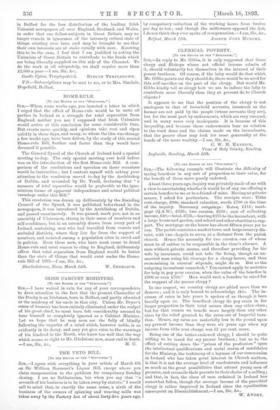CLERICAL POVERTY.
[To THE EDITOR OF THE " SPEOTATOR."] Sin,—In reply to Mr. Gibbs, it is only suggested that those clergy and Bishops whose net official income admits of it, should voluntarily tax themselves in the interest of their poorer brethren. Of course, if the laity would do that which Mr. Gibbs points out they should do, there would be no need for this self-sacrifice on the part of the clergy. But would Mr. Gibbs kindly tell us clergy how we are to induce the laity to contribute more liberally than they at present do to Church objects P It appears to me that the position of the clergy is not analogous to that of household servants, inasmuch as the former are not paid by the people (whose servants they are)., but for the most part by endowments, which are very unequal, and in many cases very inadequate. It is because of this inequality, and because these endowments bear no relation to the work done and the claims made on the incumbents, that the poorer class may look for some generosity at the hands of the more wealthy.—I am, Sir, 8zo., C. W. H. KENRICK, Vicar of Holy Trinity, Reading. Ingleside, Beading, March 12th.


































 Previous page
Previous page